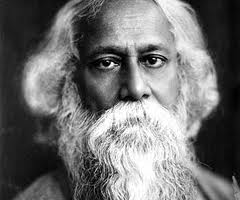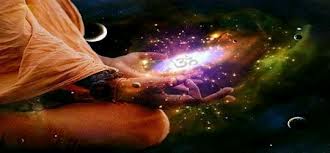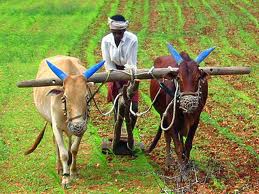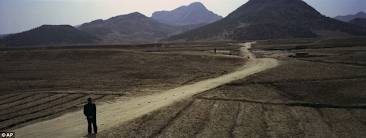Difference between revisions of "Work is Worship"
| (5 intermediate revisions by the same user not shown) | |||
| Line 1: | Line 1: | ||
| − | = | + | Poet Rabindranath Tagore is a poet,philosopher,and teacher. He wrote poetry,drama and fiction in the Bengali language and was also a celebrated artist and musician. [[File:Work_is_Worship_html_m398d4bea.jpg| right]] |
| + | |||
| + | He won the noble prize for the literature in 1913 after the publication of 'Digitalizing English', a volume of spiritual poetry. In 1919 he established at Shantiniketan a university for promoting cultural co-operation between the east and the west and named it Vishwa-Bharathi. | ||
| + | |||
| + | =Poem= | ||
Leave this chanting and singing and telling of beads! | Leave this chanting and singing and telling of beads! | ||
| − | Whom dost thou worship in this lonely dark corner of a temple with doors all shut? | + | Whom dost thou worship in this lonely dark corner of a temple with doors all shut?<br> |
| − | Open thine eyes and see thy God is not before thee | + | Open thine eyes and see thy God is not before thee<br> |
| − | He is there the tiller is tilling the hard ground and where the path-maker is breaking stones. | + | He is there the tiller is tilling the hard ground and where the path-maker is breaking stones.<br> |
| − | He is with them in sun and shower,and his garment is covered with dust. | + | He is with them in sun and shower,and his garment is covered with dust.<br> |
| − | Put off thy holy mantle and even like him come down on the dusty soil! | + | Put off thy holy mantle and even like him come down on the dusty soil!<br> |
| − | Deliverance? Where is this deliverance to be found? | + | Deliverance? Where is this deliverance to be found? <br> |
| − | Our master himself has joyfully taken upon him the bonds of creation; he is bound with us all forever. | + | Our master himself has joyfully taken upon him the bonds of creation; he is bound with us all forever.<br> |
| − | Come out of thy meditations and leave aside thy flowers and incense! | + | Come out of thy meditations and leave aside thy flowers and incense!<br> |
| − | What harm is there if thy clothes become tattered and stained? | + | What harm is there if thy clothes become tattered and stained?<br> |
| − | Meet him and stand by him in toil and in sweat of thy brow. | + | Meet him and stand by him in toil and in sweat of thy brow.<br> |
[[File:Work_is_Worship_html_150f7ca9.jpg]] | [[File:Work_is_Worship_html_150f7ca9.jpg]] | ||
| Line 25: | Line 29: | ||
[[File:Work_is_Worship_html_3169dad5.jpg]] | [[File:Work_is_Worship_html_3169dad5.jpg]] | ||
| − | |||
| − | |||
| − | |||
| − | |||
| − | |||
| − | |||
| − | |||
| − | |||
==Theme of the poem== | ==Theme of the poem== | ||
Latest revision as of 15:16, 31 January 2013
Poet Rabindranath Tagore is a poet,philosopher,and teacher. He wrote poetry,drama and fiction in the Bengali language and was also a celebrated artist and musician.
He won the noble prize for the literature in 1913 after the publication of 'Digitalizing English', a volume of spiritual poetry. In 1919 he established at Shantiniketan a university for promoting cultural co-operation between the east and the west and named it Vishwa-Bharathi.
Poem
Leave this chanting and singing and telling of beads!
Whom dost thou worship in this lonely dark corner of a temple with doors all shut?
Open thine eyes and see thy God is not before thee
He is there the tiller is tilling the hard ground and where the path-maker is breaking stones.
He is with them in sun and shower,and his garment is covered with dust.
Put off thy holy mantle and even like him come down on the dusty soil!
Deliverance? Where is this deliverance to be found?
Our master himself has joyfully taken upon him the bonds of creation; he is bound with us all forever.
Come out of thy meditations and leave aside thy flowers and incense!
What harm is there if thy clothes become tattered and stained?
Meet him and stand by him in toil and in sweat of thy brow.
Theme of the poem
Karmayoga (socially productive and useful work) alone will help man achieve liberation from rebirth.
Seven deadly sins by Mahatma Gandhi
- wealth without work
- pleasure without conscience
- science without humanity
- knowledge without character
- politics without principle
- commerce without morality
- worship without sacrifice.
Best line of the poem which I liked most:
Put off the thy holy mantle and even like him come down on the dusty soil!
Quotations which emphasize importance of work or Karmayog
- work before you play
- work is food for noble mind
- There is no shortcut to hard work
- work without love is slavery – M. Teresa
New words
- Chant-say a prayer in a singing voice
- Till(verb)-prepare and use land for growing crops
- Garment-dress
- Deliverance-final release from rebirth
- Bead-a small round ball of wood
Suggested books for further reading
- Vachana's of lord Basavanna
- Vachana's of Sarvajnana
- Vachana's of Allam Prabhu and Akka mahadevi
Contributed by: Dundappa Talwar, GHS Malla.B, Shorapur





